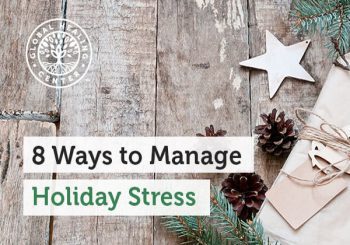Guest Writer for Wake Up World
People young and old look forward to the holidays, but once the festivities draw near, the things we eagerly anticipated can become major stressors. In fact, an estimated 80 percent of Americans expect to feel stressed during the holidays.[1] There are holiday parties, out of state trips, inclement weather, gifts to buy, dinners with family or friends, and maybe a few traditions that you’d rather skip. All of these things can fray your nerves and turn joyous holiday festivities into taxing pressures.
Stress can lead us to eat or drink more than we normally would, which can become its own source of anxiety. Stress also takes a toll on more than just your waistline. It can also impair your immune system and make it harder to stay healthy during winter. In fact, people who suffer from constant stress are more susceptible to viral infections like the flu and common cold.[2]
To avoid letting these pressures ruin your holiday spirit, planning and stress management are essential. You can only do so much, focus on what’s achievable and enjoyable.
The social obligations, trips, pressure to buy, and family visits may all be sources of anxiety. We all know what it’s like to be pressed for time and money, and extended impositions by houseguests don’t help. Social and family pressures abound during the holidays and can grate on your feelings of hospitality and weaken your willpower at the dessert table. Let’s look at some of the most common sources of holiday stress.
Budget and Unrealistic Expectations
For many, consumerism is a major part of the holiday season. Whether you participate in the spending free-for-all a little or a lot, it’s a reality. In fact, nine out of 10 people plan to buy something solely because of the holidays.[1] That’s not inherently bad; it’s emotionally rewarding to give gifts, and, for many people, generosity is how they get into the holiday spirit. The issue, however, is when the budget ends and overspending begins.
Memories
The holidays are a sentimental time and reflecting upon the past is to be expected. For many people, memories are bittersweet. It’s nice to think about friends and family, but those happy memories may be clouded if those people are no longer with us. And, sometimes going home for the holidays stirs up memories of old conflicts that, left unchecked, might take over your thoughts this holiday season.
Depression
The winter blues can be exacerbated by short days and long nights. If you’re skipping your after-work exercise because of the cold weather or dark evenings, you are missing out on the psychological benefits of working out.[4] The shortened period of sunlight might also cause you to experience seasonal affective disorder or the appropriately abbreviated SAD. This disorder is actually a type of depression and characterized by a range of symptoms that accompany changes in weather.[5] Make sure to take a D3 supplement to counteract the lack of sunshine in winter!
Gaining Weight
Work Environment and Deadlines
A toxic work environment or multiple pressing deadlines to meet before the end of the year can prevent you from fully enjoying the holidays. Working in retail or sales is especially stressful because of long holiday hours, contentious customers, and the pressure to meet quotas.
Social Obligations
Oftentimes, we’re expected to participate in things because of tradition or obligation. Yes, these events may bring us together with extended family, but they’re not always easy. Unexpected or last minute guests can exacerbate tensions further.
Best Tips for Managing Holiday Stress
Give yourself a buffer and anticipate that anxiety or emotionally trying events may arise. Your health status and attitude are powerful predictors of your holiday experience, so make an effort to stay on top of both your physical and mental well-being.
1. Set Realistic Goals and Expectations
To mitigate the stress of gifts, set a realistic budget, make your list early, do your research, and shop online. The retail store madness isn’t worth the stress of going out after work, fighting for a parking spot, and contending with long lines.
Set realistic expectations for gift giving. This will alleviate any pressure to spend more than you’re comfortable with. You can make the holidays special without breaking the bank.
2. Focus on the Positive and Smile
You can’t control everything, so focus on the positive and make the best of things. Whether you’re the guest or the host, make peace with the old tensions that keep you from feeling at ease. Finding common ground is one of the best ways to bond with those who have different beliefs or opinions. Do yourself a favor and avoid hot-button topics, like politics, at the table.
Even if you’re not where you want to be, try to have a good time while you’re there and smile. A little laughter will do you good. In fact, studies show that laughing out loud has real health benefits,[6] so give it a shot.
3. Make Time for Yourself
If you feel overwhelmed, don’t hesitate to take a few moments for yourself. Holiday parties and preparations can be draining, and you can only help others when you take care of yourself. Set aside time to take a yoga class or meditate. Schedule an aromatherapy massage as a gift to yourself.
If you’re at a party and it starts to feel a little too much, find a quiet room or corner. Take deep, calming breaths and focus on being present. You’ll be better equipped to handle social situations when you’re lucid.
4. Sleep Well
It might be tempting to stay up all night while you’re on vacation, but regular sleep must be a priority, even on holidays. Exhaustion makes everything more difficult — from driving to controlling your emotions.[7] Even worse, ongoing sleep deprivation has been linked to heart disease, obesity, high blood pressure, stroke, and kidney disease.[7] Shoot for 7 to 8 hours every night.[8]
5. Seek Support if Needed
Don’t be afraid to seek help if you are suffering from serious depression. Reach out for professional help or communicate your feelings to sympathetic and trusted friends or family.
6. Exercise
Exercise is a great mood booster; it’s especially helpful for those dealing with anxiety[9] or depression.[10] Try to get outside for a little air, even a brisk walk can raise your spirits. Try to walk in a natural area: People who went for a 90-minute walk outside in a natural environment have healthier brain activity than those who walked through an urban area.[11] Not only is exercise great for SAD,[12] it’s an excellent opportunity to clear your head.
7. Stick to a Healthy Diet
Holiday weight gain can be a result of stress or a stressor itself.[13] It might be a challenge, but you can always make healthy decisions; moderation is a great place to start. Take smaller servings, drink a glass of water before eating, and skip the seconds. If you cook, prepare dishes that are healthful, like this green bean salad recipe. If you’re feeling anxious, try these stress-relieving foods.
8. Remember What The Holidays Are About
The holidays are supposed to be a time of celebration. Spend your holiday time relaxing and enjoying your friends and family. Indulge yourself a little, but not too much. Relax, hydrate, rest, and have fun. Allow yourself to enjoy the holidays, and you’ll look forward to them every year.
From Global Healing to you and yours, have a happy, healthy holiday season.
References:
- “Tips for parents on managing holiday stress.” American Psychological Association. Nov. 2012. Web. 23 Nov. 2016.
- “Fact Sheet on Stress.” National Institute of Mental Health. n.d. Web. 23 Nov. 2016.
- “Consumers’ Holiday Spending Estimate Matches Recent Years.” Gallup. Gallup.com, 17 Oct. 2016. Web. 23 Nov. 2016.
- Bagchi, Debasis, Sreejayan Nair, and Chandan K. Sen. Nutrition and Enhanced Sports Performance. N.p.: Academic Press, 2013. Book. 23 Nov. 2016.
- “Seasonal Affective disorder.” Medline Plus. National Library of Medicine, 12 Oct. 2016. Web. 23 Nov. 2016.
- Strean, William B. “Laughter Prescription.” Official Publication of the College of Family Physicians of Canada 55.10 (2009): 965–967. Web. 23 Nov. 2016.
- Gibbons, Gary H. “Why is Sleep Important?” National Heart, Lung, and Blood Institute. 19 Aug. 2014. Web. 23 Nov. 2016.
- Centers for Disease Control and Prevention. “How Much Sleep Do I Need?” CDC.gov. CDC, 12 Nov. 2015. Web. 23 Nov. 2016.
- Anderson, Elizabeth, and Geetha Shivakumar. “Effects of Exercise and Physical Activity on Anxiety.” Frontiers in Psychiatry 4. (2013): n.pag. Web. 23 Nov. 2016.
- Craft, Lynette L., and Frank M. Perna. “The Benefits of Exercise for the Clinically Depressed.” The Primary Care Companion to the Journal of Clinical Psychiatry 6.3 (2004): 104–111. Web. 23 Nov. 2016.
- Bratman, Gregory N, et al. “Nature Experience Reduces Rumination and Subgenual Prefrontal Cortex Activation.” Proceedings of the National Academy of Sciences 112.28 (2015): 8567–8572. Web. 23 Nov. 2016.
- “Seasonal affective disorder.” Medline plus. 1 Nov. 2016. Web. 23 Nov. 2016.
- “This Holiday Season, Eat Mindful, Not Mindless.” American Heart Association. Sept. 2016. Web. 23 Nov. 2016.
Originally published at Global Healing Center and reproduced here with permission.
About the author:
Dr. Edward F. Group III (DC, ND, DACBN, DCBCN, DABFM) founded Global Healing Center in 1998 with the goal of providing the highest quality natural health information and products. He is world-renowned for his research on the root cause of disease. Under his leadership, Global Healing Center earned recognition as one of the largest natural and organic health resources in the world. Dr. Group is a veteran of the United States Army and has attended both Harvard and MIT business schools. He is a best-selling author and a frequent guest on radio and television programs, documentary films, and in major publications.
Dr. Group centers his philosophy around the understanding that the root cause of disease stems from the accumulation of toxins in the body and is exacerbated by daily exposure to a toxic living environment. He believes it is his personal mission to teach and promote philosophies that produce good health, a clean environment, and positive thinking. This, he believes, can restore happiness and love to the world.
For more, please visit Global Healing Center.
Psilocybin mushrooms, also known as “magic mushrooms,” are reemerging as powerful tools for emotional and spiritual healing. Backed by scientific research, these sacred medicines have shown promise in addressing anxiety, depression, PTSD, and more. However, working with psilocybin requires preparation, intention, and integration to ensure safe and meaningful experiences.
In this 7-week course, a leading herbalist and expert in psilocybin will guide you through every step of the journey. You’ll learn the history, science, and best practices for safe use and how to prepare for your experience, set intentions, and integrate insights into your daily life. Whether you’re curious or ready to take the next step, this course offers the support you need.
Start your journey toward emotional wellness and spiritual growth today. Sign up for this transformative online event and discover how psilocybin mushrooms can help you unlock your fullest potential. Don’t wait — take the first step now!
If you’ve found value in our articles, we invite you to support the release of our brand-new book, “Gratitude Practices for Kids: A Practical Guide for Adults to Instill a Spirit of Appreciation and Positivity in the Next Generation.“
“Gratitude Practices for Kids” brings together over 25 innovative and accessible practices designed to enhance gratitude in everyday life. This comprehensive guide is backed by 17 scientific studies, ensuring each concept is grounded in research, underscoring our commitment to nurturing growth, emotional intelligence, and positive interactions between adults and children.
We encourage you to opt for the paperback version to celebrate this new release. Dive into its fresh pages away from digital distractions, allowing you to immerse yourself in the transformative practices it offers.
Over recent years, Wake Up World has faced significant online censorship, which has impacted our financial ability to operate. Moving into book publishing represents a strategic step to secure the ongoing funds needed to continue our mission. By purchasing Gratitude for Kids, you help us keep our content free and accessible to everyone, avoiding needing a paywall. With over 8,500 articles published in the last 13 years, we remain dedicated to keeping our valuable content open to all.










